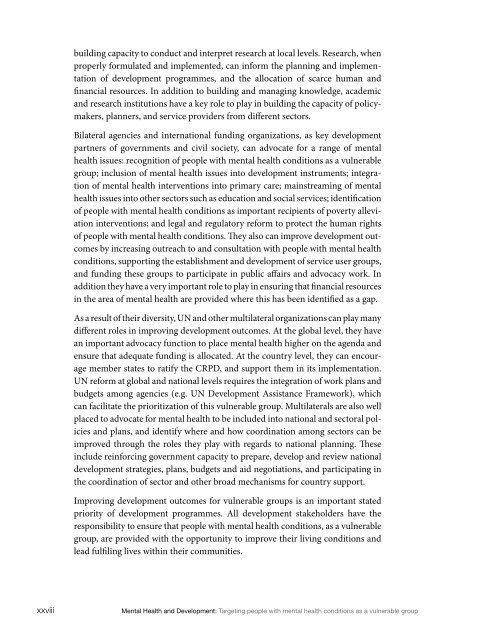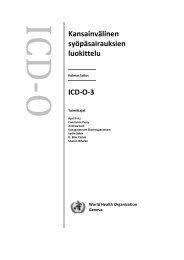MENTAL HEALTH AND DEVELOPMENT: - libdoc.who.int - World ...
MENTAL HEALTH AND DEVELOPMENT: - libdoc.who.int - World ...
MENTAL HEALTH AND DEVELOPMENT: - libdoc.who.int - World ...
You also want an ePaper? Increase the reach of your titles
YUMPU automatically turns print PDFs into web optimized ePapers that Google loves.
uilding capacity to conduct and <strong>int</strong>erpret research at local levels. Research, when<br />
properly formulated and implemented, can inform the planning and implementation<br />
of development programmes, and the allocation of scarce human and<br />
financial resources. In addition to building and managing knowledge, academic<br />
and research institutions have a key role to play in building the capacity of policymakers,<br />
planners, and service providers from different sectors.<br />
Bilateral agencies and <strong>int</strong>ernational funding organizations, as key development<br />
partners of governments and civil society, can advocate for a range of mental<br />
health issues: recognition of people with mental health conditions as a vulnerable<br />
group; inclusion of mental health issues <strong>int</strong>o development instruments; <strong>int</strong>egration<br />
of mental health <strong>int</strong>erventions <strong>int</strong>o primary care; mainstreaming of mental<br />
health issues <strong>int</strong>o other sectors such as education and social services; identification<br />
of people with mental health conditions as important recipients of poverty alleviation<br />
<strong>int</strong>erventions; and legal and regulatory reform to protect the human rights<br />
of people with mental health conditions. They also can improve development outcomes<br />
by increasing outreach to and consultation with people with mental health<br />
conditions, supporting the establishment and development of service user groups,<br />
and funding these groups to participate in public affairs and advocacy work. In<br />
addition they have a very important role to play in ensuring that financial resources<br />
in the area of mental health are provided where this has been identified as a gap.<br />
As a result of their diversity, UN and other multilateral organizations can play many<br />
different roles in improving development outcomes. At the global level, they have<br />
an important advocacy function to place mental health higher on the agenda and<br />
ensure that adequate funding is allocated. At the country level, they can encourage<br />
member states to ratify the CRPD, and support them in its implementation.<br />
UN reform at global and national levels requires the <strong>int</strong>egration of work plans and<br />
budgets among agencies (e.g. UN Development Assistance Framework), which<br />
can facilitate the prioritization of this vulnerable group. Multilaterals are also well<br />
placed to advocate for mental health to be included <strong>int</strong>o national and sectoral policies<br />
and plans, and identify where and how coordination among sectors can be<br />
improved through the roles they play with regards to national planning. These<br />
include reinforcing government capacity to prepare, develop and review national<br />
development strategies, plans, budgets and aid negotiations, and participating in<br />
the coordination of sector and other broad mechanisms for country support.<br />
Improving development outcomes for vulnerable groups is an important stated<br />
priority of development programmes. All development stakeholders have the<br />
responsibility to ensure that people with mental health conditions, as a vulnerable<br />
group, are provided with the opportunity to improve their living conditions and<br />
lead fulfiling lives within their communities.<br />
xxviii MentalHealthandDevelopment:Targetingpeoplewithmentalhealthconditionsasavulnerablegroup

















